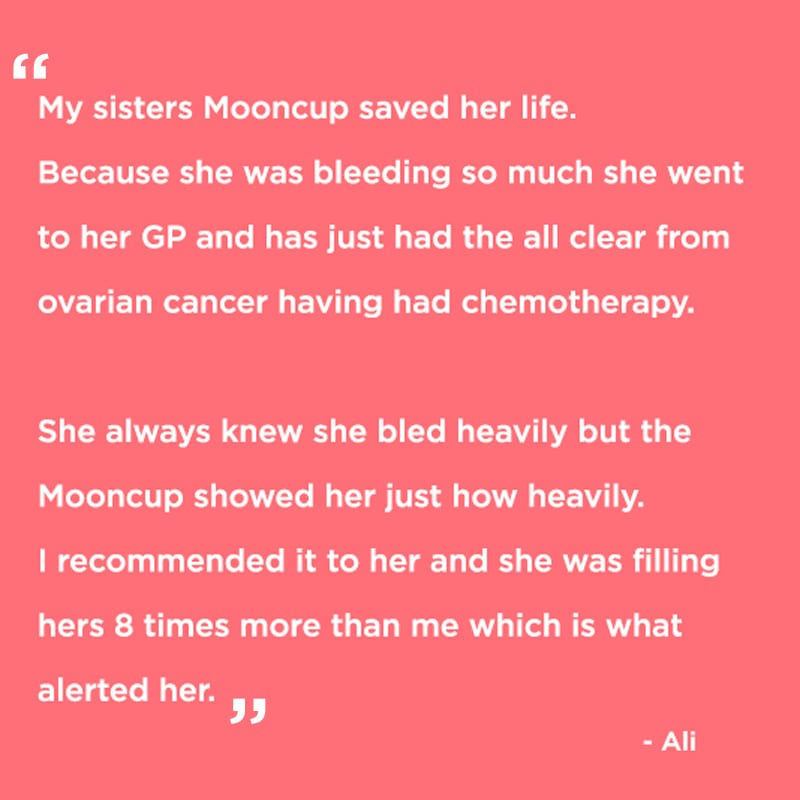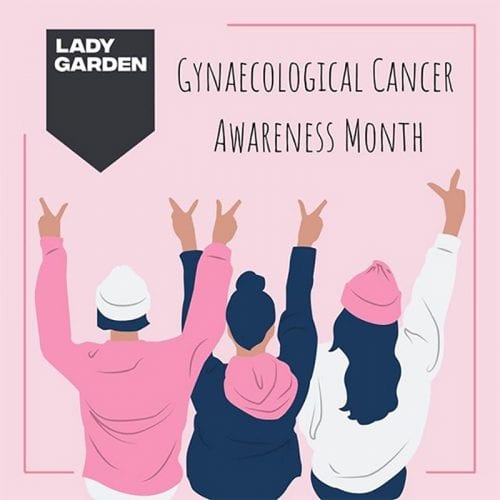What are the five gynaecological cancers and their symptoms?
There are five different types of gynae cancers that start in the reproductive system: cervical, ovarian, vaginal, vulval and womb (often called uterine or endometrial). Every day approximately 58 of us are diagnosed with a gynaecological cancer in the UK. With awareness about these cancers generally low, a tragically high proportion currently end with a terminal cancer diagnosis. Meanwhile early detection and diagnosis can play a critical part in improved cancer outcomes: learning to recognise the symptoms really can help save lives.
Know your flow
A recent study by the charity Eve Appeal found that 8 in 10 women would not visit their doctor because of unexpected vaginal bleeding even though it’s a key symptom of three out of five gynaecological cancers (womb, cervical and vaginal). Some of the reasons provided for what was stopping them from visiting the doctor were fear, embarrassment or being unaware of the cancer symptoms.
Eve Appeal is campaigning for all of us to track our bleeding to recognise anything abnormal in our cycle. Using a period tracker app such as Clue can help to spot irregularities. While most people with heavy or abnormal bleeding won’t have cancer, it’s good to have anything unusual checked by your doctor.
We know from the feedback we get from medical professionals and our community that a Mooncup® menstrual cup can be a great way of monitoring your blood loss. The millilitre markings on the Mooncup can be used to roughly monitor your flow, which may be helpful information to share with your doctor if you’re concerned about your periods.
 Get to know the five gynaecological cancers
Get to know the five gynaecological cancers
Recognising the early signs of gynae cancers is critical for having the best possible outcome. Unusual bleeding is a common symptom across all gynae cancers, but there are other signs to be aware of.
Having one or some of the symptoms below does not mean you have cancer, but awareness of them can help save lives.
Cervical cancer
Cervical cancer is the most common cancer in women under 35 years old. The good thing is there is a free cervical screening programme in place to detect any abnormalities. This test, more commonly known as smear, is not a test for cancer. However, the screening programme prevents approximately 75% of cervical changes from developing into cancers.
At the smear test appointment a nurse takes a sample of cells from your cervix. They’ll gently put a smooth, tube-shaped speculum into your vagina. The nurse will open the speculum so they can see your cervix. Using a small, soft brush, they’ll take a small sample of cells from your cervix. This takes less than 5 minutes, and the whole appointment is usually over in about 10 minutes.
What are the warning signs of cervical cancer?
Symptoms can include:
- Bleeding between periods, after sex or during menopause
- Pain during sex
- Unpleasant smelling vaginal discharge
 Womb cancer
Womb cancer
Womb, or uterus cancer is the fourth most common cancer in women in the UK. Most womb cancers occur in the endometrium meaning that the cancer starts in the lining of the womb. The most common symptom of womb cancer is unusual bleeding: around 90% of cases are picked up because of post-menopausal or irregular vaginal bleeding.
What are the warning signs of womb cancer?
Symptoms can include:
- Bleeding between periods, after sex or after the menopause
- Heavier periods
- Vaginal discharge
- Pain in the lower abdomen, back or pelvis
Ovarian cancer
Ovarian cancer is the second most common gynaecological cancer and it’s more common in those over the age of 50. The symptoms of ovarian cancer can be vague and similar to symptoms of other less serious conditions. However if the symptoms persist, it’s worth seeing your doctor.
What are the warning signs of ovarian cancer?
Symptoms can include:
- Feeling bloated
- Pelvic or lower tummy pain
- Needing to pass urine more frequently
- Feeling full quickly or loss of appetite
- Change in bowel habits
 Vulval cancer
Vulval cancer
Vulval cancer is a rare type of cancer and it’s more common in those over 65 years old. It affects the genitals outside your body. These include the lips (labia) surrounding the vagina, clitoris and the Bartholin’s glands which are 2 small glands at each side of the vagina.
What are the warning signs of vulval cancer?
Symptoms can include:
- Pain or tenderness in your vulva
- Persistent itch
- Vaginal discharge or bleeding
- A lump or ulcer in the vulva
- Changes to the texture or colour of the skin
Vaginal cancer
Vaginal cancer is a rare type of cancer especially in those under 40. As the name suggests, it starts in the vagina. As many as 20% of those diagnosed with vaginal cancer don’t have symptoms at all. Your doctor or nurse may pick up very early vaginal cancer during routine cervical screening.
What are the warning signs of vaginal cancer?
- Bleeding between periods, after sex or after the menopause
- Blood in urine
- Different smell to vaginal discharge
- Persistent vaginal itch
- Lump or growth in the vagina
 Understanding the symptoms will save lives
Understanding the symptoms will save lives
September is gynaecological cancer awareness month. It’s time to challenge another taboo to do with our periods, vulvas and vaginas. And at Mooncup, we’re ready with almost 20 years’ practice at this particular pastime!
Gyneacological health charity Lady Garden Foundation is running #SilentNoMore campaign on social media to encourage more open talk about our bodies. When Lady Garden Foundation started in 2014, their surveys showed that 41% of us were too embarrassed to go to the doctor about a gynaecological issue, let alone talk to a friend. The charity is now looking to do away with the ‘private’ in our ‘private parts’, and we can all help.
The better we know and understand our vulvas and vaginas, the more likely we are to know when something isn’t right.
What you can do?
- Share this blog post to spread the word
- Don’t fear the smear! Cervical screening saves thousands of lives every year, but one in four women in the UK do not attend their test when invited.
- Learn to spot the symptoms and stay #SilentNoMore. NHS is a great resource for this.
- Donate to a charity, like Eve Appeal or Lady Garden Foundation
Read more on the Mooncup blog:
What Is Endometriosis? | Everything You Need To Know
How To Manage Heavy Periods
How to keep your vagina and vulva happy & healthy
Menstrual Cup Safety & Effectiveness – Mooncup Respond To The Lancet’s Report





